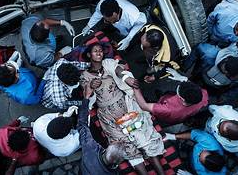How Vladimir Putin and Yevgeny Prigozhin’s son have rebranded the mercenary group in the Sahel.
“There’s a little Russia growing inside Burkina Faso,” a Burkinabe official told me. “First you put down one settlement, somewhere you can speak safely, where you don’t have any Americans or French. Then you multiply, like mushrooms.”
In the seven months since Yevgeny Prigozhin’s “unclarified” plane crash, a shadowy battle has been playing out to determine the fate of the Wagner Group in Africa. Junta leaders in Mali, Niger, and the Central African Republic (CAR) are becoming alarmed about the mercenary group’s atrophy in their countries, not to mention the unclear future of Prigozhin’s commercial empire.
Prigozhin’s death has left a vacuum in the leadership of Wagner, raising questions about the future of its operations in Africa. However, there are signs that the mercenary group is adapting. His son, Pavel Prigozhin, appears to have stepped into a leadership role, with the mercenaries continuing their activities despite his father’s demise. This transition is shaping Wagner’s future in the region, and its operations are increasingly focused on maintaining influence in countries like Mali and Niger, where Russia’s influence is expanding.
Wagner’s operations in Africa are crucial to Russia’s strategic interests on the continent, particularly in the Sahel region, where insecurity and instability are pervasive. The group has been involved in various roles, from securing mining operations to offering military support to local governments. However, with the potential decline in Wagner’s influence, local governments are concerned about the future of their partnerships with the mercenary group, especially with the unpredictable nature of leadership changes.
As the situation evolves, the Western powers, particularly France and the United States, have been monitoring Wagner’s movements in the region. The group’s activities have often been a thorn in the side of Western interests, and the rebranding of Wagner under the leadership of Pavel Prigozhin could signal new challenges for Western influence in Africa.
Despite these shifts, Wagner’s continued presence in Africa reflects the growing role of private military companies in global geopolitics, with Russia leveraging its mercenary forces as a tool of influence across the continent. For now, Wagner’s future in Africa seems uncertain, but its ability to adapt and continue its operations in key regions suggests that it will remain a force to be reckoned with for the foreseeable future.

